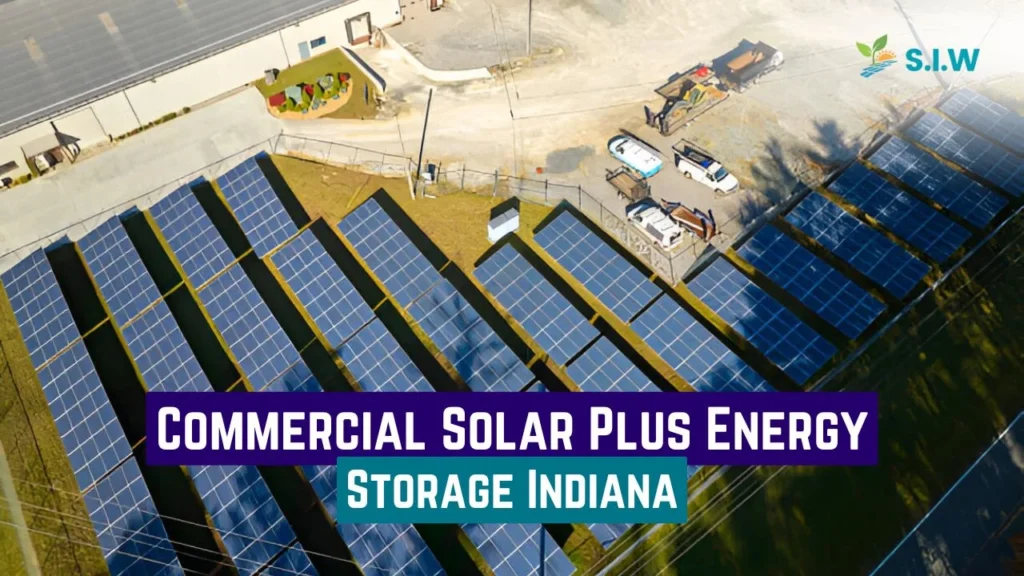Integrating solar energy with battery storage offers Indiana businesses a sustainable and cost-effective strategy to manage energy consumption. This combination not only lowers operational costs but also enhances grid independence. With commercial solar plus storage, organizations can store excess energy generated during the day and utilize it during peak periods or emergencies, ensuring seamless operations even in power outages.
Benefits of Commercial Solar Plus Storage
1. Peak Demand Reduction and Energy Cost Savings
Solar panels generate electricity during the day, but peak energy use often occurs in the late afternoon or evening. A battery energy storage system (BESS) bridges this gap by storing solar power for later use. This load-shifting reduces reliance on grid electricity during high-demand periods, cutting energy bills and avoiding costly demand charges.
2. Backup Power and Enhanced Reliability
Incorporating storage ensures uninterrupted power supply during outages. With grid reliability being a growing concern, businesses operating 24/7, such as healthcare facilities, manufacturers, and educational institutions, can maintain operations smoothly.
3. Grid Independence and Sustainability
Solar plus storage minimizes dependency on the utility grid by generating and storing energy on-site. This not only lowers environmental impact but also shields businesses from fluctuations in energy prices, promoting long-term financial stability.
Key Industries Leveraging Solar Storage Solutions in Indiana
- Manufacturing: Factories benefit from energy cost control by using stored power during off-peak hours.
- Healthcare: Hospitals ensure continuity of critical services through reliable backup power.
- Education: Schools utilize solar energy to power campuses and reduce operational budgets.
- Municipalities: Local governments manage public infrastructure costs more efficiently with renewable energy systems.
Optimizing Solutions: Pairing with EV Charging and Building Automation
Combining solar with energy-efficient technologies like EV charging stations and building automation systems maximizes operational efficiency. Solar-powered EV chargers not only meet growing electric vehicle demand but also attract eco-conscious customers. Meanwhile, integrating storage with automated systems allows facilities to further optimize energy use, ensuring lights, HVAC systems, and other equipment run only when needed.
Financial Incentives and Funding Opportunities in Indiana
To make solar storage systems more accessible, businesses can take advantage of multiple financial incentives:
- Federal Investment Tax Credit (ITC): Covers a portion of the installation costs.
- Accelerated Depreciation: Allows businesses to recover their investment faster through tax deductions.
- State Grants and Rebates: Indiana offers targeted grants and rebates to promote renewable energy adoption.
Additionally, many companies opt for ESCO partnerships to access development capital, tax equity funding, and project financing, making solar plus storage projects more feasible even for large-scale industrial applications.
Case Studies: Proven Success in Solar Storage Deployment
Numerous businesses across Indiana have already adopted solar-plus-storage solutions with impressive results. Facilities that integrate battery systems with solar panels report improved energy resilience, reduced downtime during outages, and notable cost savings over time.
Future-Proofing Businesses with Solar Storage
Investing in solar plus storage is a forward-thinking approach that empowers Indiana businesses to manage energy more efficiently while contributing to environmental sustainability. With a range of funding options and significant operational benefits, companies can future-proof their operations and gain a competitive edge by adopting these renewable solutions.
FAQs
Q1: How does solar plus storage benefit 24/7 facilities?
A: These systems provide backup power and ensure consistent energy availability even during outages, crucial for 24/7 operations like hospitals and manufacturing plants.
Q2: What incentives are available for commercial solar in Indiana?
A: Businesses can benefit from the federal ITC, accelerated depreciation, and state-specific grants or rebates.
Q3: Can solar storage systems be integrated with other technologies?
A: Yes, solar pairs well with EV charging stations and building automation systems, further enhancing energy efficiency.
Q4: Is solar storage a reliable backup option during power outages?
A: Absolutely. A well-sized battery storage system ensures continuous power, protecting businesses from unexpected downtime.








